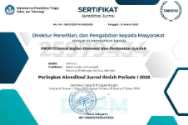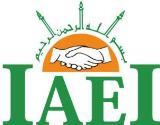KOLABORASI LEMBAGA KEUANGAN, PEMERINTAH DAN PERUSAHAAN DALAM MENINGKATKAN PERAN KOPERASI KARYAWAN INDUSTRI SEBAGAI ALTERNATIF SOLUSI DALAM PEMBANGUNAN SEKTOR EKONOMI INDONESIA
Authors (s)
(1) * Endah Robiatul Adawiyah
 (STEI Al-Amar Subang Jawa Barat)
(STEI Al-Amar Subang Jawa Barat)
(*) Corresponding Author
AbstractThe role of cooperative and MSMEs in economic growth are very important. In 1998, Indonesia experienced economic crisis, the cooperative business units and MSMEs were relatively stable and able to survive compared to the large companies. According to date from the ministry of cooperatives and UMKM, in 2019 the number of cooperatives will be 126,343 units, although this number has decreased from 2014, which was 212,570 units. Seeing this certainly becomes a big hope or opportunity for Indonesia economic growth, however in general the development of cooperatives, still experiences various obstacles, especially in terms of capital and accessing capital sources. In Act no.3 of 2004, Bank Indonesian Bank policy in assisting the development of small and medium-sized businesses and cooperatives , is more about technical assistance and institutional development. The task of managing credit has been transferred to SOEs including BRI, Bank BTN and PT. Nastional Capital Madani (PNM) banks. The optimization of the role of SOEs in the development of Indonesian cooperatives is indicated to be not optimal, especially in capital finance working, in this study, the writer will focus more on the cooperative of employees in an industrial company, which is still less touched by the stakeholders until now on. (One employee cooperative of PT.Tirta Investma (AQUA), Tirta Bangun Karya Cooperative, Subang Regency, West java, the research approach is based on the basic assumptions of social science, which will be conducted by the way of researchers’ analyzing of phenomenon or reality, analized by using SWOT analysis. This study aims to Provide an overview of the business cooperatives opportunities, especially cooperative employees of an industry, explaining the involvement and mengagement of stakeholders in develoving and finacing the role of industrial employee cooperatives as the main business partners of companies that shelter, For Describing the government framework in providing the recommendations to stakeholders in cevelopment programs is to support government programs in priority economic fields. From the research conducted, it can be concluded that : Government policies relatied to the development of industrial cooperatives, namely : in general, government policies in developing cooperative, as such they are independent and have been realized ate not only carried out by one or two ministry institutions but by various institutions, such as the ministry of cooperatives and MSMEs, ministries industry, ministry of trade, and BAPENAS, Bank of Indonesia, BUMN and Non Bank Finacial Institutions. Various from of support are given to cooperatives such as guidance, assistance and financing. Related to this the government always tries to facilitate cooperatives to have access to finance from financial institutions or banks and non banks. These facilities include subsidized banking credit, guarantees of non-bank institutions, financing from SEO profit allowance, grants and others. Company policy in developing employee cooperatives, namely: The company is a partner in running the company’s business wheels meaning that all efforts of the company to run the business always involve cooperatives, of course, this must be bound in the MoU between the company and the cooperative both in writing. The Members of the cooperative are employees of the company in which the cooperative belongs. A PKB ( Collective Labor Agreement) was made between the union and company management which one of the contents of the collective Labor Agreement is cooperative. In the contents of the Collective Labor Agreement, there are no cooperative there are no specific regulations regarding the involvement of cooperetives as Company’s partners. Banking policy in developing cooperatives, the model link program between banks and cooperative, has been running using the scheme of executing , channeling and joint finance. It is necessary to develop a model for developing the distribution of funds to cooperatives, in which to support the cooperative business with cooperative is part of the company vendor/ supplier. Banking policies in terms of cooperative business funding need to be developed softer, because in general, the employee cooperative do not have variable or large assets yet. In which this has always been a requirement of a bank in funding cooperative. A collaboration has been conducted between bank and cooperative in terms of financing cooperative members though an exceceuting system. There is no easy access to financial cooperative businesses father than the employee of finance itself. There needs a synergy between the Government- financing Institutions and cooperative companies to put coopretives as a supporter of the Indonesian economiy, as such the recommendations for the central government though the relevant ministries are signed, they should be able to pay more attenstion on cooperative for industrial employee. By issuing the relevant regulations or laws with pathnerships, between employee cooperative and company management, the local government should have the courage to issue a regulation relating partnerships between employee cooperatives and companies through related agencies, companies must create policies towards the employee cooperative as the main business partners of companies and financial institutions, especially banks must play a more active roles in communication, outreach, guidance and the realizing channeling funds to improve cooperative business units through soft funding and policies that can facilitate cooperative In obtaining funding and financial institutions must be able to run government program in terms of funding the cooperatives of industrial employee. |
Keywords
Full Text: PDF
Refbacks
- There are currently no refbacks.
Copyright (c) 2020 Endah Robiatul Adawiyah
This work is licensed under a Creative Commons Attribution-NonCommercial-ShareAlike 4.0 International License.
Published by Islamic Faculty of Nurul Jadid University, Probolinggo, East Java, Indonesia.





.jpg)



